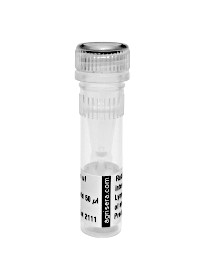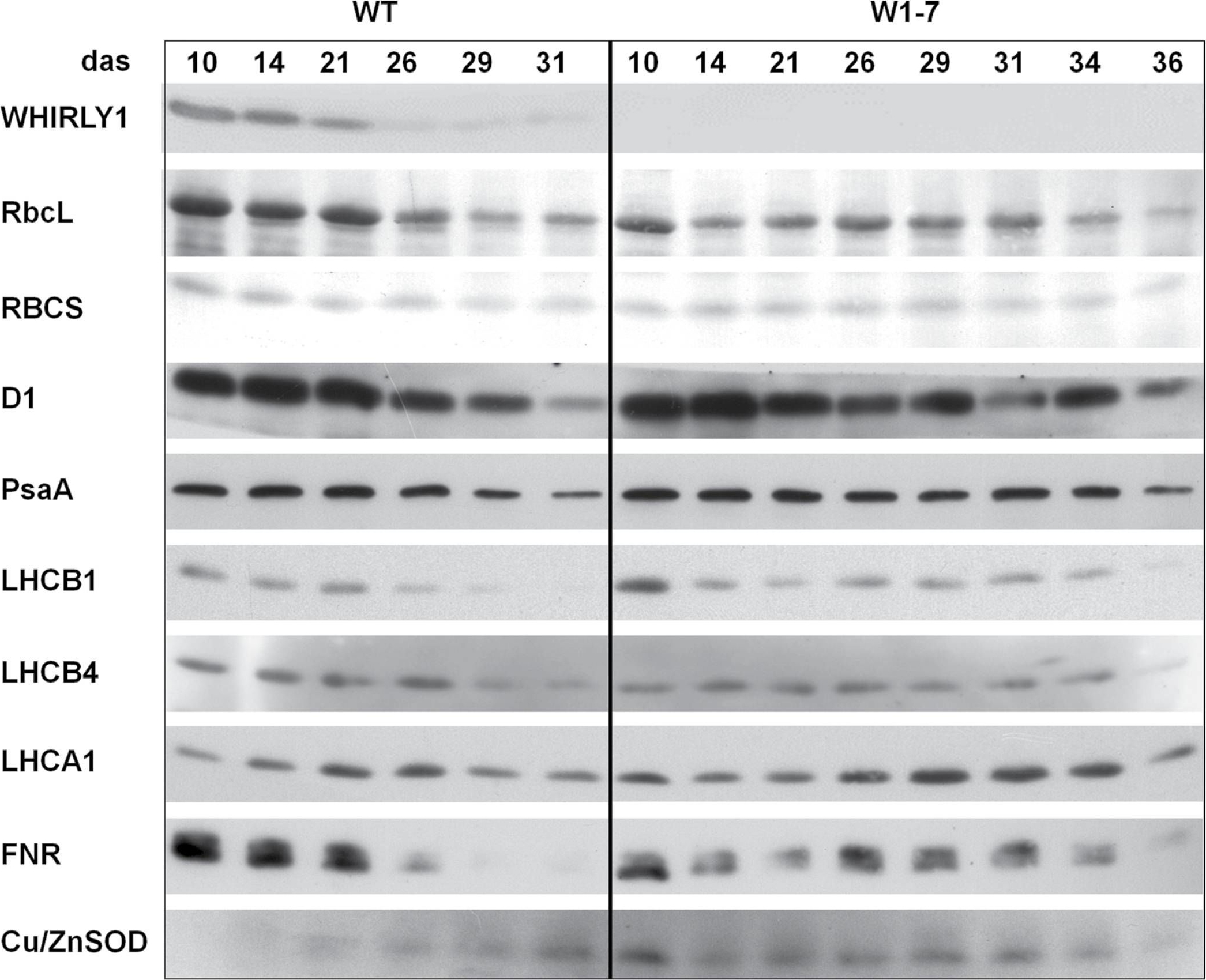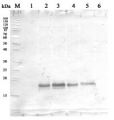1

Anti-CSD2 | Chloroplastic Cu/Zn superoxide dismutase
AS06 170 | Clonality: Polyclonal | Host: Rabbit | Reactivity: A.thaliana, A.maritima, B.juncea, D.sanguinalis, E.crus-galli, E.tef, I.pumila, H.vulgare, I. walleriana, L.formosana, N.cataria, M. sativa, N.rtanjensis, O.sativa, P.Sogo Yukidian cultivar V3, P.vulgaris, P.sativum, Populus sp., S.superba, S.lycopersicum, S.tuberosum, Z.mays
- Product Info
-
Immunogen: overexpressed Arabidopsis thaliana Cu/ZnSOD O78310, At2g28190 with an N-terminal His-tag. Purified via Ni-column. The His-tag was cleaved and the protein was recovered via ion exchange on a 10 ml resource-Q (Pharmacia) column using a NaCl gradient. Pure fractions after dialysis against PBS has been used for immunization.
Host: Rabbit Clonality: Polyclonal Purity: Serum Format: Lyophilized Quantity: 50 µl Reconstitution: For reconstitution add 50 µl of sterile water Storage: Store lyophilized/reconstituted at -20°C; once reconstituted make aliquots to avoid repeated freeze-thaw cycles. Please remember to spin the tubes briefly prior to opening them to avoid any losses that might occur from material adhering to the cap or sides of the tube. Tested applications: Western blot (WB) Recommended dilution: 1 : 1000-1 : 4000 (WB) Expected | apparent MW: 22 | 19 kDa (Arabidopsis thaliana)
- Reactivity
-
Confirmed reactivity: Arabidopsis thaliana, Armeria maritima, Brassica juncea, Digitaria sanguinalis, Echinochloa crus-galli, Eragrostis tef, Hordeum vulgare, Impatiens walleriana, Iris pumila, Liquidambar formosana, Medicago sativa,Musa acuminate, Musa paradisiaca L., Nepeta cataria, Nepeta rtanjensis, Oryza sativa, Phalenopsis Sogo Yukidian cultivar V3, Phaseolus vulgaris, Pisum sativum, Populus sp., Schima superba, Solanum lycopersicum, Solanum tuberosum, Zea mays
Predicted reactivity: Cucumis melo, Glycine max, AS06 170, Pinus pinaster, Spinacia oleracea
Species of your interest not listed? Contact usNot reactive in: No confirmed exceptions from predicted reactivity are currently known - Application Examples
-
Application examples: 
Reactant: Hordeum vulgare (Barley)
Application: Western Blotting
Pudmed ID: 28338757
Journal: J Exp Bot
Figure Number: 6A
Published Date: 2017-02-01
First Author: Kucharewicz, W., Distelfeld, A., et al.
Impact Factor: 6.088
Open PublicationImmunological analyses of the relative amounts of photosynthesis-associated proteins during senescence of primary leaves from wild-type (WT) and RNAi-W1-7 plants grown at high irradiance. Samples were prepared from wild-type plants grown for 10, 14, 21, 26, 29, and 31 das, as well as from RNAi-W1-7 plants grown for 10, 14, 21, 24, 29, 31, 34, and 36 das. The analysis was done with two biological replicates. WHIRLY1, photosynthesis-related proteins, and Cu/ZnSOD were detected by specific antibodies.
- Additional Information
-
Additional information: This product can be sold containing ProClin if requested.
Additional information (application): Note: Antibody is recognizing 19 kDa protein Csd2 (chloroplastic enzyme) and gives also low but noticeable reactivity to Csd1 (15 kDa) a cytosolic form
- Background
-
Background: Antioxidant system works as a defense against oxidative stress. SOD (superoxide dismutase) catalyzes the dismutation of superoxide into oxygen and H202,. SODs are classified, according to their metal cofactor, as FeSOD, MnSOD, or Cu / ZnSOD. Chloroplasts generally contain Cu/ZnSOD and, in a number of plant species, FeSOD
- Product Citations
-
Selected references: Böde et al. (2025). Lipid Phase Behaviour of the Curvature Region of Thylakoid Membranes of Spinacia oleracea. Physiol Plant. 2025 May-Jun;177(3):e70289. doi: 10.1111/ppl.70289.
Krupinska et al. (2025). Iron allocation to chloroplast proteins depends on the DNA-binding protein WHIRLY1. Planta. 2025 Jun 17;262(2):32. doi: 10.1007/s00425-025-04736-8.
Zhuang et al (2021). EGY3 mediates chloroplastic ROS homeostasis and promotes retrograde signaling in response to salt stress in Arabidopsis. Cell Rep. 2021 Jul 13;36(2):109384. doi: 10.1016/j.celrep.2021.109384. PMID: 34260941.
Wang et al. (2021). Brassinosteroids inhibit miRNA-mediated translational repression by decreasing AGO1 on the endoplasmic reticulum. J Integr Plant Biol. 2021 May 21. doi: 10.1111/jipb.13139. Epub ahead of print. PMID: 34020507.
Fesharaki-Esfahani et al. (2021) A highly efficient, thermo stable and broad pH adaptable copper-zinc super oxide dismutase (AmSOD1) mediates hydrogen peroxide tolerance in Avicennia marina,Phytochemistry,Volume 187,2021,112766,ISSN 0031-9422,https://doi.org/10.1016/j.phytochem.2021.112766.
Konkolewska et al. (2020). Combined use of companion planting and PGPR for the assisted phytoextraction of trace metals (Zn, Pb, Cd).
Shinozaki et al. (2020). Autophagy Increases Zinc Bioavailability to Avoid Light-Mediated ROS Production under Zn Deficiency. Plant Physiol. 2020 Jan 15. pii: pp.01522.2019. doi: 10.1104/pp.19.01522.
Mermod et al. (2019). SQUAMOSA promoter-binding protein-like 7 mediates copper deficiency response in the presence of high nitrogen in Arabidopsis thaliana. Plant Cell Rep. 2019 May 15. doi: 10.1007/s00299-019-02422-0.
Witzel et al. (2017). Temporal impact of the vascular wilt pathogen Verticillium dahliae on tomato root proteome. J Proteomics. 2017 Oct 3;169:215-224. doi: 10.1016/j.jprot.2017.04.008.
Vuleta et al. (2016). Adaptive flexibility of enzymatic antioxidants SOD, APX and CAT to high light stress: The clonal perennial monocot Iris pumila as a study case. Plant Physiol Biochem. 2016 Mar;100:166-73. doi: 10.1016/j.plaphy.2016.01.011. Epub 2016 Jan 19.
Dmitrović et al. (2015). Essential oils of two Nepeta species inhibit growth and induce oxidative stress in ragweed (Ambrosia artemisiifolia L.) shoots in vitro. Acta Physiologiae Plantarum, February 2015, 37:64.
Tuteja et al. (2015). Heterologous expression and biochemical characterization of a highly active and stable chloroplastic CuZn-superoxide dismutase from Pisum sativum. BMC Biotechnology 2015, 15:3 doi:10.1186/s12896-015-0117-0.
Parys et al. (2014). Metabolic Responses to Lead of Metallicolous and Nonmetallicolous Populations of Armeria maritima. Arch Environ Contam Toxicol. 2014 Jul 29.
Momcilović et al. (2014). Improved procedure for detection of superoxide dismutase isoforms in potato, Solanum tuberosum L. Acta Physiologiae Plantarum, August 2014, Volume 36, Issue 8, pp 2059-2066.
Huey-wen et al. (2014). Harpin Protein, an Elicitor of Disease Resistance, Acts as a Growth Promoter in Phalaenopsis Orchids. Journal of Plant Growth Regulation May 2014.
Yang et al. (2012). Quantitative proteomic analysis reveals that antioxidation mechanisms contribute to cold tolerance in plantain (Musa paradisiaca L.; ABB Group) seedlings. Mol Cell Proteomics. 2012 Dec;11(12):1853-69. doi: 10.1074/mcp.M112.022079. - Protocols
-
Agrisera Western Blot protocol and video tutorials
Protocols to work with plant and algal protein extracts - Reviews:
-
This product doesn't have any reviews.
Accessories

AS06 125 | Clonality: Polyclonal | Host: Rabbit | Reactivity: A. maritima, A. thaliana, B. juncea, Ch. reinhardtii, D. bardawil, D.salina, M. sativa, Morus spp.,O. sativa, Salicornia sp., S. tuberosum, winter triticale, Z. mays


